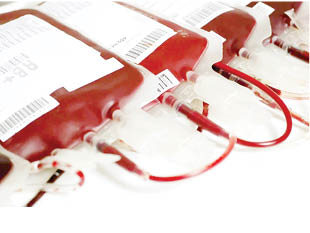A simple blood test could detect signs of 19 different cancers up to seven years before symptoms strike, promising research suggested today.
Under two landmark trials, scientists from the University of Oxford found more than 600 proteins in the blood were linked to types, including breast, bowel and prostate.
Of these, 107 were identified among Brits whose blood was collected at least seven years before diagnosis.
Research has long shown catching the disease early, when it’s most treatable, can boost survival odds up to eight-fold.
War on Gaza: WHO says Rafah assault will lead to bloodbath
High blood pressure: Why you should comply with treatment
Experts hope the proteins could now be used to speed up detection rates, allowing patients to get treated earlier and help develop targeted new treatments.
Dr Iain Foulkes, executive director of research and innovation at Cancer Research UK, which funded the studies, added: ‘Preventing cancer means looking out for the earliest warning signs of the disease.
“That means intensive, painstaking research to find the molecular signals we should pay closest attention to.
“Discoveries from this research are the crucial first step towards offering preventive therapies which is the ultimate route for giving people longer, better lives, free from the fear of cancer,” he said.
Dr Karl Smith-Byrne, a senior molecular epidemiologist at Oxford Population Health, added: “This research brings us closer to being able to prevent cancer with targeted drugs – once thought impossible but now much more attainable.”
Meanwhile, Professor Ruth Travis, a senior molecular epidemiologist at Oxford Population Health, said: “These studies are important because they provide many new clues about the causes and biology of multiple cancers, including insights into what’s happening years before a cancer is diagnosed.
“We now have technology that can look at thousands of proteins across thousands of cancer cases, identifying which proteins have a role in the development of specific cancers, and which might have effects that are common to multiple cancer types.”
Under the first study, researchers analysed blood samples of more than 44,000 Brits, including 4,900 who were later diagnosed with cancer.
The team used proteomics — the study of proteins to help learn how cancer develops and spreads — to analyse 1,463 proteins from a single sample of blood from each person.
They then compared how these differed between Brits who were later diagnosed with cancer and those who were not, identifying which may be linked to the disease.
Scientists also found 182 proteins that differed in the blood three years before a cancer diagnosis.
In the second study, researchers looked at genetic data from more than 300,000 cancer cases to analyse which blood proteins were involved in cancer development and could be targeted by new treatments.
Writing in the journal, Nature Communications, they noted, however, that while altering these proteins may increase or decrease the chances of someone developing cancer, in some cases it may lead to unintended side-effects.
Further research is vital to uncover which are the most reliable ones to test for, what tests could be developed to detect the proteins in a clinic, and which drugs could target the proteins, they added.
Screening programmes are among the most effective ways to detect early-stage cancers.
Mail Online

 Join Daily Trust WhatsApp Community For Quick Access To News and Happenings Around You.
Join Daily Trust WhatsApp Community For Quick Access To News and Happenings Around You.


